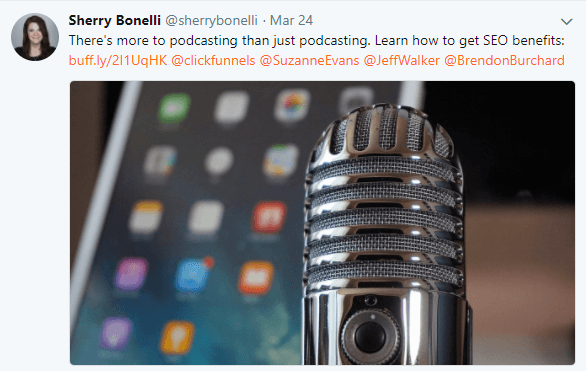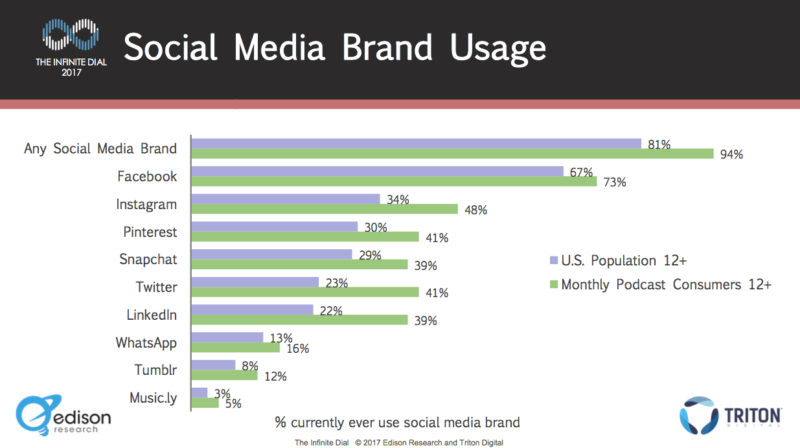The power of podcasting: SEO keyword angles
In Part 2 of a three-part series, Contributor Sherry Bonelli dives into the details of optimizing a podcast for maximum SEO, link and brand-building benefit.

This is Part 2 of a three-part series. Part 1 can be found here.
Once you are booked on a podcast, brush up on the host’s website, bio and about page.
Listen to recent podcast episodes so you can get a feel for the types of questions being asked, learn a little bit about the host and ask about audience demographics. You have an opportunity to speak with someone who is going to listen to you for 20 or 30 minutes of their time — you must make an impression!
Before the podcast interview, the host or one of their representatives will typically contact you to chat about what they want to cover on the podcast. If they don’t reach out to you, you should contact them and ask if you can schedule a time to talk about what they would like to discuss on the show.
Some will want the interview to be organic and won’t share the angle they are planning to focus on; some will strategize your interview so that you both can tailor a message that will best help the podcast audience.
As an example, when I was interviewed on Phil Singleton’s podcast, The Local Business Leaders Podcast, we decided I would talk about local search engine optimization (SEO). But as we talked, we also decided I would talk about a local SEO success story I had with a client who was an attorney. That gave both of us an angle for the podcast, and through our discussion, we’d get attorney SEO-related keywords that would be included in the transcript of the episode.
Remember, the audience trusts the show host, so as a result, you get an automatic “seal of approval.” And remember, the entire show is dedicated to you! You’re the person of the hour, and it’s costing you nothing but your time. SWEET!
Think SEO during the podcast interview
Prepare for the interview by brainstorming and writing down a list of keywords, influencers, companies, blogs, universal resource locators (URLs), books, etc. that pertain to the topic of the show and keep that sheet of notes handy so you can refer to that list and use those examples throughout the interview.
As you are being interviewed, think of how you can use those keywords naturally during the conversation with the host. If you mention links, make a quick note and be sure you provide the direct link to the host after the interview, so they can add them to the show notes.
When you’re talking, speak to their main audience. Now, like many speakers, you may use similar examples in almost every interview or presentation you give, but tailor those answers to meet the audience’s interests. Remember to teach and share your best information; don’t pitch your services. You’re there to teach, not sell your products or services.
Mention what you admire
During the interview, mention books, influencers or other companies you admire or like to work with. You can use these types of people and companies as examples.
Once the podcast is uploaded and available to the public, you can promote the podcast on social media.
Be sure to mention the influencer, his or her company, software or book on social media. You’ll likely get kudos or a thank-you for mentioning these people or companies. Just make sure you don’t sound like a sales pitch when you’re a guest on a podcast. Remember, you’re only there to share information, not to sell.
Use names, companies and keywords and examples naturally throughout the show, just as you would if you were writing an article.
Keep an SEO mindset
Throughout the interview, keep an SEO mindset. Think carefully about the words and phrases you are using. The content and information you share in the show will benefit you in multiple ways, so try to be strategic in what you say.
During the podcast interview, be very purposeful in how you mention your website or business. Don’t talk about your business too much. At the end of the show, the host will usually give you an opportunity to mention something about how people can learn more about you and your business. This is the time to mention your URL and work in a call to action (CTA) for a special offer only available to podcast listeners.
Plan ahead: Set up a special page on your site with an offer, pixel visitors and capture names and email addresses and give them something awesome in return.
Make your offer redeemable only on your site.
SEO benefits after the podcast
Once you’re done with your guest interview, you’ll breathe a sigh of relief and feel really good!
Don’t forget to send the host an email thanking them for having you as a guest, and be sure to provide the host with all the links you mentioned during the show.
Reach out to those influencers, let them know you shared their websites and books in your podcast, and then leave a link to the podcast. Many will share the podcast link with their fans and followers.
Getting these shares is just one more way to amplify your SEO benefits through social media. Be sure to social tag these people when you make your social media post like this:
You can also send them an email or direct message them on social media as well.
After the podcast recording is done, the host is going to do most of the work to promote the recording, driving people to visit your site so they can find out more information about you. However, you will also want to do your part to share on your social media channels as well. This cross-promotion between you and the podcast will benefit everyone from a search and social perspective.
Since podcast listeners are more active on social media, you can use that to your advantage to promote your podcast guest interview through your social media channels. This gives you a huge, well-rounded digital marketing strategy to help promote your podcast interview.
Links and asking for reviews
At the end of the show, be sure to send the podcast host a list of the links you mentioned during the interview, so they can easily put them in the show notes.
It’s been shown that Google considers online reviews in their ranking factors. At the end of every show, send an email, politely ask the host for a review based on your knowledge during the podcast interview, and offer to leave them a review on iTunes as well. This will lead to new reviews that can help you with rankings and credibility. The podcast host will be thrilled that you’re leaving a review for them as well.
Leaving great reviews may help you land more guest spots, so be sure to leave a review that is fair, informative and lets others know you are available as a podcast guest.
This ends Part 2 of our three-part series: SEO and podcasting. In Part 3, we’ll learn how to build personal and brand authority with podcasts, look at how podcasts generate backlinks and discuss how to transcribe audio files for more SEO-rich content. Stay tuned!
Read more of this series on mastering podcasting:
Contributing authors are invited to create content for Search Engine Land and are chosen for their expertise and contribution to the search community. Our contributors work under the oversight of the editorial staff and contributions are checked for quality and relevance to our readers. The opinions they express are their own.
Related stories



